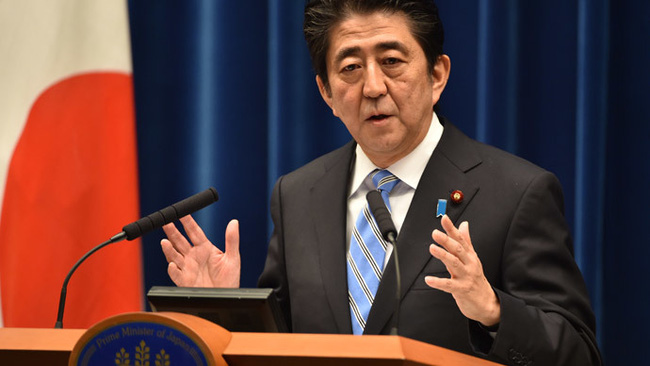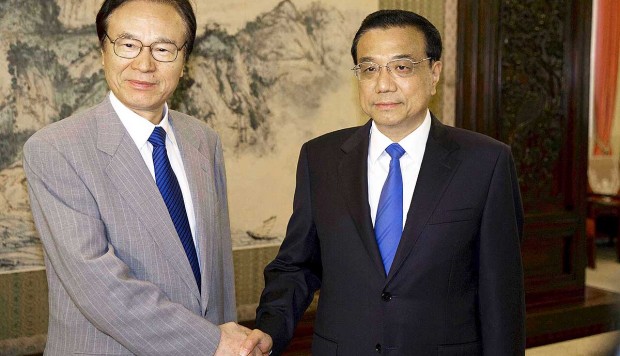Memo #403
By: Giulio Pugliese – giulio.pugliese [at] kcl.ac.uk

Abe Shinzō’s comeback in December 2012 triggered a new dynamism in Japanese security practices. Relative domestic political stability, a deteriorating regional environment, and Abe’s appreciation for high politics has enabled the Japanese government to push for constitutional reinterpretation, pass embattled security legislation, and inaugurate new security guidelines governing the US-Japan alliance. Under the “proactive contribution to peace” banner – enshrined in its first-ever National Security Strategy (issued in December 2013) − Japan pledged to more decisively defend the global commons. Indeed, the Abe administration has couched its foreign policy rhetoric within a language of universal values and the international rule of law.
What causal logic produced these changes?
Underneath the fluttering banners of universalism, Japanese foreign and security policies actually remain abidingly loyal to a Realist logic. Japan is fundamentally concerned with China’s re-emergence to regional primacy, in particular its development of a blue-water navy and its aggressive behavior in the East and South China Seas. Japan’s 2016 decision to allow the export of nuclear technology to India − a strategic partner that is not a signatory to the Nuclear Non-Proliferation and Comprehensive Nuclear-Test-Ban Treaties – and its courting of an aggressive Russia are proof that security trumps international norms. Abe’s Japan has gone beyond balancing China’s rise: it has invested in the military as a tool of statecraft to negotiate from a position of strength; flexed its economic muscle for political and geopolitical gains; and engaged in communication offensives dictated by the zero-sum logic of power politics.
Furthermore, individual state actors have dominated the political landscape and have defined the terms of Japan’s engagement with China, often on the basis of their own personal penchants. Yachi Shōtarō, Abe’s diplomatic brain currently serving as his national security advisor, and his preference for strategy, geopolitics and secret diplomacy impacts on Japan’s China policies.
Top-down policy changes are possible when these are in concordance with the United States government’s grand strategic framework and when acting in close coordination with the increasingly politicized bureaucratic apparatus.
Underneath the rhetoric of universal or global values, the Abe administration’s consistent preference for geopolitics, strategy, and China balancing provide ample proof of the validity of looking at Sino-Japanese relations and Japan’s China policy through the lenses of Realism.
About the Author:
Giulio Pugliese is a lecturer in the Department of War Studies at King’s College London. He specializes in the politics, both domestic and international, of the Asia-Pacific with a focus on Japan, China and the United States.

Japanese Prime Minister Shinzo Abe during a speech dedicated to foreign policy in January 2016. (Credit: New Eastern Outlook)

Japanese National Security Advisor Shotaro Yachi (left) shaking hands with Chinese Premier Li Keqiang (right) in 2015. (Credit: Reuters via South China Morning Post)
Links
- Giulio Pugliese, “Japan’s Kissinger? Yachi Shōtarō: the State Behind the Curtain,” Pacific Affairs 90, no. 2 (2017), forthcoming issue.
- Giulio Pugliese and Aurelio Insisa, Sino-Japanese Power Politics: Might, Money and Minds. London: Palgrave Macmillan, 2017.
- Giulio Pugliese, “Kantei diplomacy? Japan’s hybrid leadership in foreign and security policy,” The Pacific Review 30, no. 2 (2017): 152-168.
- Ministry of Foreign Affairs of Japan, “Japan’s Security Policy”.
- “India, Japan sign landmark civil nuclear deal,” The Times of India, 2016 November 16.
- George Friedman, “Examining Japan’s National Security Strategy,” Geopolitical Futures 2016 February 4.
- Saitō Takahiro, “Chugoku no taitō to Nihon no anzen hoshō: aratana anzen hoshō kankyō kōchiku ni mukete” [China’s Ascent and Japan’s Security: Towards a new security environment], Kokusai jōhō kenkyū 12, no, 1 (2014): 3-12 (Japanese). 齊藤孝弘「中国の台頭と日本の安全保障 ―新たな安全保障環境構築に向けて」『国際情報研究』12巻1号 (2014): 3-12.
- Yachi Shōtarō, “Yachi shodai kokka anpo kyokuchō ni kiku: ‘Nasebanaru’ no seishin de torikumu” [Interview with Mr. Yachi, First National Security Director: Engage with the spirit of ‘Where there is a will, there is a way”] Gaikō 23 (January 2014): 68-77. 谷内 正太郎「谷内・初代国家安保局長に聞く: 「為せば成る」の精神で取り組む」『外交』23 (2014): 68-77.